Solving Word Problems in Algebra
Inequality Word Problems
How are you with solving word problems in Algebra? Are you ready to dive into the "real world" of inequalities? I know that solving word problems in Algebra is probably not your favorite, but there's no point in learning the skill if you don't apply it.
I promise to make this as easy as possible. Pay close attention to the key words given below, as this will help you to write the inequality. Once the inequality is written, you can solve the inequality using the skills you learned in our past lessons.
I've tried to provide you with examples that could pertain to your life and come in handy one day. Think about others ways you might use inequalities in real world problems. I'd love to hear about them if you do!
Before we look at the examples let's go over some of the rules and key words for solving word problems in Algebra (or any math class).
Word Problem Solving Strategies
- Read through the entire problem.
- Highlight the important information and key words that you need to solve the problem.
- Identify your variables.
- Write the equation or inequality.
- Solve.
- Write your answer in a complete sentence.
- Check or justify your answer.
I know it always helps too, if you have key words that help you to write the equation or inequality. Here are a few key words that we associate with inequalities! Keep these handy as a reference.
Inequality Key Words
- at least - means greater than or equal to
- no more than - means less than or equal to
- more than - means greater than
- less than - means less than
Ok... let's put it into action and look at our examples.
Example 1: Inequality Word Problems
Keith has $500 in a savings account at the beginning of the summer. He wants to have at least $200 in the account by the end of the summer. He withdraws $25 each week for food, clothes, and movie tickets.
- Write an inequality that represents Keith's situation.
- How many weeks can Keith withdraw money from his account? Justify your answer.
Solution
Step 1: Highlight the important information in this problem.
Note: At least is a key word that notes that this problem must be written as an inequality.
Step 2: Identify your variable. What don't you know? The question verifies that you don't know how many weeks.
Let w = the number of weeks
Step 3: Write your inequality.
500 - 25w > 200
I know you are saying, "How did you get that inequality?"
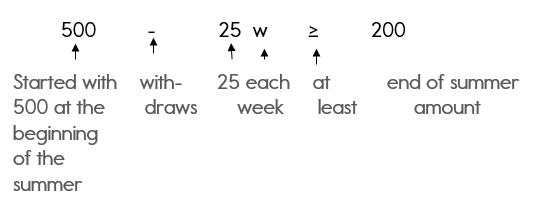
I know the "at least" part is tricky. You would probably think that at least means less than.
But... he wants the amount in his account to be at least $200 which means $200 or greater. So, we must use the greater than or equal to symbol.
Step 4: Solve the inequality.

The number of weeks that Keith can withdraw money from his account is 12 weeks or less.
Step 5: Justify (prove your answer mathematically).
I'm going to prove that the largest number of weeks is 12 by substituting 12 into the inequality for w. You could also substitute any number less than 12.
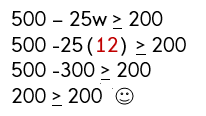
Since 200 is equal to 200, my answer is correct. Any more than 12 weeks and his account balance would be less than $200. Any number of weeks less than 12 and his account would stay above $200.
That wasn't too bad, was it? Let's take a look at another example.
Example 2: More Inequality Word Problems
Yellow Cab Taxi charges a $1.75 flat rate in addition to $0.65 per mile. Katie has no more than $10 to spend on a ride.
- Write an inequality that represents Katie's situation.
- How many miles can Katie travel without exceeding her budget? Justify your answer.
Solution
Step 1: Highlight the important information in this problem.
Note: No more than are key words that note that this problem must be written as an inequality.
Step 2: Identify your variable. What don't you know? The question verifies that you don't know the number of miles Katie can travel.
Let m = the number of miles
Step 3: Write the inequality.
0.65m + 1.75 < 10
Are you thinking, "How did you write that inequality?"
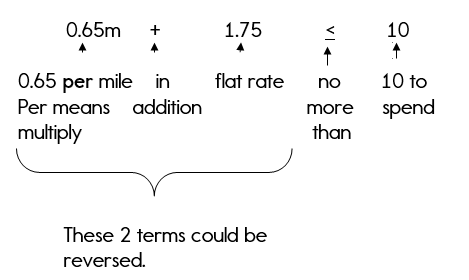
The "no more than" can also be tricky. "No more than" means that you can't have more than something, so that means you must have less than!
Step 4: Solve the inequality.
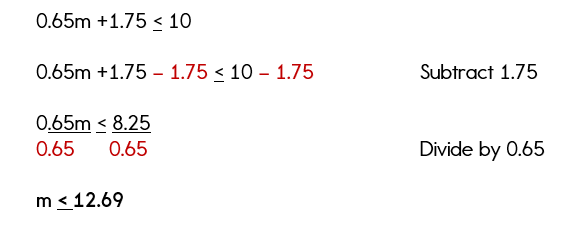
Since this is a real world problem and taxi's usually charge by the mile, we can say that Katie can travel 12 miles or less before reaching her limit of $10.
Step 5: Justify (prove your answer mathematically).
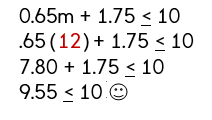
Are you ready to try some on your own now? Yes... of course you are! Click here to move onto the word problem practice problems.
Take a look at the questions that other students have submitted:

Quite a complicated problem about perimeter and area of a rectangle
This is a toughie.... a compound inequalities word problem

Need More Help With Your Algebra Studies?
Get access to hundreds of video examples and practice problems with your subscription!
Click here for more information on our affordable subscription options.
Not ready to subscribe? Register for our FREE Pre-Algebra Refresher course.





Comments
We would love to hear what you have to say about this page!